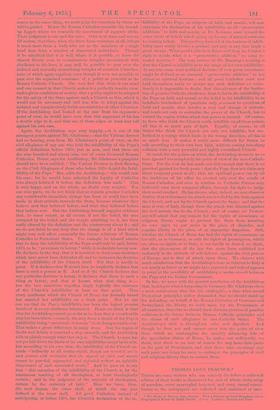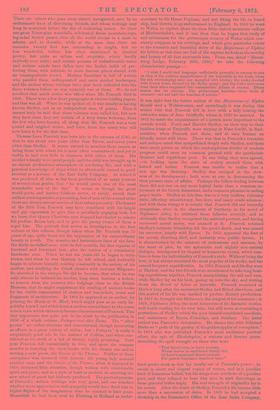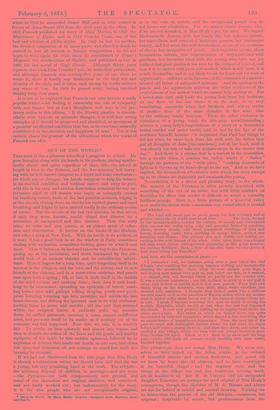THOMAS LOVE PEACOCK.* THERE are some writers who can scarcely
die before a collected edition of their works is clamoured for, and of whom every scrap of anecdote, every apocryphal bon-mot, and every casual contri- bution to the newspapers are collected and enshrined at once.
• The Works of Thomas Love Peaeoek. With a Preface by Lord Houghton, and • Biographical Notice by Edith Nicoll& 3 voht. London: Bentley and Bona
There are others who pass away almost unregarded, save by an enthusiastic knot of discerning friends, and whose writings may long lie scattered before the day of reckoning comes. So there are great Norwegian waterfalls, celebrated Swiss mountain-tops, legended Scotch passes, that all the world troops in a mass to admire and to describe, while at the same time there are cascades twenty feet less astounding in height, but no less wonderful, valleys leas often mentioned in classical poetry, but quite as sylvan and exquisite, which hardly anybody ever visits ; and certain persons of unfashionable tastes and recluse minds have fallen into the foolish habit of pre- ferring these, with solitude, to more famous places shared with an unsympathetic crowd. Modern literature is full of writers who parallel these unfrequented and more modest landscapes, and the author whose writings have just been collected into the three volumes before us was certainly one of them. We do not recollect that much notice was taken when Mr. Peacock died in 1866. There were a few short paragraphs in various leading papers, and that was all. When he was spoken of, it was usually as having known Shelley, not as an independent man of genius. Then it cannot truly be said that these volumes were called for, but now they have come they are certain of a very warm welcome, from the few who have known all along that Mr. Peacock was a very quaint and original writer, and later, from the many who will now learn it for the first time.
Thomas Love Peacock was born late in the autumn of 1785, so that be was about two years older than Byron, and seven years .older than Shelley. It seems natural to mention these names, as being those with which his is most often remembered, and yet in reality he had very little in common with either of them. His mother's family were naval people, and the child was brought up in an almost professional atmosphere of sea-faring life, and with a practical knowledge of ships which he afterwards turned to good account as a servant of the East India Company. At school it -was predicted of him, as has been predicted of so many persons of second-class genius, that "he would prove one of the most remarkable men of the day." It seems as though the great world-poets and master-thinkers never, or rarely, struck their earliest contemporaries as promising, but of men of the second order there are always current stories of their infant precocity. Thebeauty of the little Tom Peacock may have combined with his bright and gay expression to give him a peculiarly engaging look, for we learn that Queen Charlotte once stopped her chariot to admire his profuse, flaxen hair, and to give the pretty owner of them a regal kiss. The portrait that serves as frontispiece to the first volume of this edition, though taken when Mr. Peacock was 72 years of age, quite bears out the impression of his extraordinary beauty in youth. The massive and harmonious lines of the face, the finely-modelled nose, with its full nostrils, the fine expanse of forehead and luxuriant hair, give the notion of a remarkably handsome man. When he was ten years old he began to write verses, and when he was thirteen he left school, and forthwith began to educate himself, reading constantly in the society of his mother, and studying the Greek classics with extreme liiligence. So absorbed in the antique life did he become, that when he was only sixteen he induced his mother, long since become a widow, to remove from the country into lodgings close to the British Museum, that he might supplement his reading of ancient books by the visible commentary of statues and bas-reliefs, coins and fragments of architecture. In 1804 he appeared as an author, by printing the Monks of St. Mark, which might pass as an early In- goldsby legend, and which bears a curious resemblance to the comic vein in verse which ultimately became characteristic of Peacock. This tiny appearance was quite put in the shade by the publication in 1806 of a whole volume, Palmyra and other Poems. The "other poems" are rather tiresome and conventional, though interesting as efforts in a great variety of styles ; but "Palmyra" is really a surprisingly good ode in the manner of Collins, and when con- sidered as the work of a lad of twenty, highly promising. Next year Peacock fell romantically in love, and spent the summer months in haunting the river-banks with his chosen one and in writing a new poem, the Genius of the Thames. Neither of these enterprises was crowned with success ; the young lady married another man, and the Genius of the Thames, when it appeared in 1810, attracted little attention, though written with considerable spirit and grace, and in a style at least as modern as anything the new school of poets had hitherto produced. The poetical promise of Peacock's earliest writings was very great, and one wonders whether more appreciation and sympathy would have fired him to higher flights of the imagination than he reached in later years. Meanwhile he had been over to Flushing in Holland as under-
secretary to Sir Home Popham, and not liking the life on board ship, had thrown it up and returned to England. In 1810 he went to Wales, to explore alone the then little-visited mountain-valleys of Merionethshire, and it was then that he began that study of and enthusiasm for the picturesque scenery of Wales which con- stantly reappear in his writings, and which give particular colour to the romantic and beautiful story of the Misfortunes of Elphin; his letters at this time are full of the rapture he feels at the novelty and beauty of all that surrounds him. From one, dated "Maent- wrog Lodge, February 26th, 1810," we take the following characteristic passage :—
" I wish I could find language sufficiently powerful to convey to you an idea of the sublime magnificence of the waterfalls in the frost, when the old, overhanging oaks are spangled with icicles; the rocks sheeted with frozon foam, formed by the flying spray ; and the water that oozes from their sides congealed into innumerable pillars of crystal. Eirery season has its charms. The picturesque tourists—those birds of summer—see not half the beauties of nature."
It was right that the future author of the Misfortunes of Elphin should wed a Welshwoman, and accordingly it was during this winter visit that Peacock fell in love with a lady bearing the orthodox name of Jane Gryffydh, whom in 1820 he married. In 1812 he made the acquaintance of a person more important to the outside world. Percy and Harriet Shelley, on their way to their luckless home at Tanyrallt, were staying at Nant Gwillt, in Rad- norshire, when Peacock met them, and at once became on friendly terms with them. There was that in Peacock's eccentric and antique mind that sympathised deeply with Shelley, and there were many points on which the contemptuous derider of modern progress could meet on common ground with the pantheistic dreamer and republican poet. In one thing they were agreed, —in looking upon the state of society around them with hatred and horror. Peacock was unable to realise that a new age was dawning ; Shelley was enraged at the slow- ness of its development ; both were at one in denouncing the then present state of affairs. Perhaps the fellow-feeling between them did not rest on any more logical basis than a common en- joyment of the Greek dramatists, ands common pleasure in sailing paper boats. Shelley at this time was in a very restless, visionary state, affecting misanthropy, free-love, and many crude schemes ; and with these things it is certain that Peacock did not inwardly sympathise, since in the character of Scythrop, in his novel of Nightmare Abbey, he satirised these fallacies severely, and so obviously that Shelley recognised the satirical portrait, and having recovered moral sanity, was amused at it. Peacock retained Shelley's intimate friendship till the poet's death, and was named his executor, jointly with Byron. In 1816 appeared the first of his novels, Headlong Hall, and instantly won public favour. It is characterised by the mixture of enthusiasm and sarcasm, by the want of plot, by the aphoristic and slightly non-natural dialogue, interspersed by elegant or humorous verses, which com- bine to form the individuality of Peacock's style. Without being the best, it has always remained the most popular of his works, and has earned frequent republication. In 1815 Peacock and Shelley were at Marlow, and the two friends were accustomed to take long boat- ing expeditions together, Peacock manipulating the sail and oars, while Shelley lay on his back, gazing up into-the sky, and writing down the Revolt of Islam at intervals. Peacock remained at Marlow long after the mercurial Shelley had flitted elsewhere, and this period of his life was marked by profuse literary production. In 1817 he brought out Melincourt, the longest of his romances ; in 1818, Nightmare Abbey, the most humorous of his fantastic stories, well worth reading for its own sake, but still more as containing a portraiture of Shelley which the poet himself considered excellent, and caricatures of Byron, Coleridge, and Southey. The latter author was Peacock's detestation. He classes him with Edmund Burke as "gods of the garden of the golden apples of corruption."
In 1818 also was published Peacock's most ambitious poetical effort, the epic of Rhododaphne, a curious and dreamy poem, describing the spell wrought on those who wore
"That laurel-rose, to Love profane, Whose leaves in semblance falsely fair Of Love's maternal-flower contain For purest fragrance deadliest bane."
Such poetic work as this lay totally out of Peacock's power ; he excels in short and elegant copies of verses, and in a peculiar kind of humorous ballad, but his wings were not those of a genuine poet, and they refused to bear him save in such flutteriugs as these graceful trifles imply. His real strength of originality lay in his novels. After the death of Shelley, Peacock's life became little more than a succession of dates. In 1819 he had accepted a clerkship in the Examiner's Office of the East India Company,
where in 1836 he succeeded James Mill, and in 1856- retired in favour of John Stuart Mill from the chief post in the office. In 1822 Peacock published his story of Maid Marian, in 1829 the Misfortunes of Elphin, and in 1831 Crotchet Castle, one of the best and wittiest of all his stories. In 1833 he lost his mother, the devoted companion of so many years, and after her death he seemed to lose all interest in literary composition ; he did not begin to write again till 1852, when he contributed to Fraser's Magazine his recollections of Shelley, and published as late as 1860 his last novel of Gryll Grange. Although thirty years separate this book from Crotchet Castle, its immediate predecessor, and although Peacock was seventy-five years of age when he wrote it, there is hardly any diminution in the racy wit and vivacity of the style, and it takes rank among his works without any sense of loss. In 1866 he passed away, having survived Shelley forty-four years.
It is not to be expected that Peacock can ever become a really popular writer,—his feeling is essentially one out of sympathy with our times ; but as Lord Houghton well says in his pre- fatory notice to this edition, "If the literary passion is irrecon- cilable with historic or scientific thought, it is well that strong examples of it should be preserved and cherished, as specimens of , a peculiar intellectual condition that has, in its own time, assuredly contributed to the elevation and happiness of man." Nor is this esoteric charm the greatest of the attractions which the works of Peacock can offer.




































 Previous page
Previous page